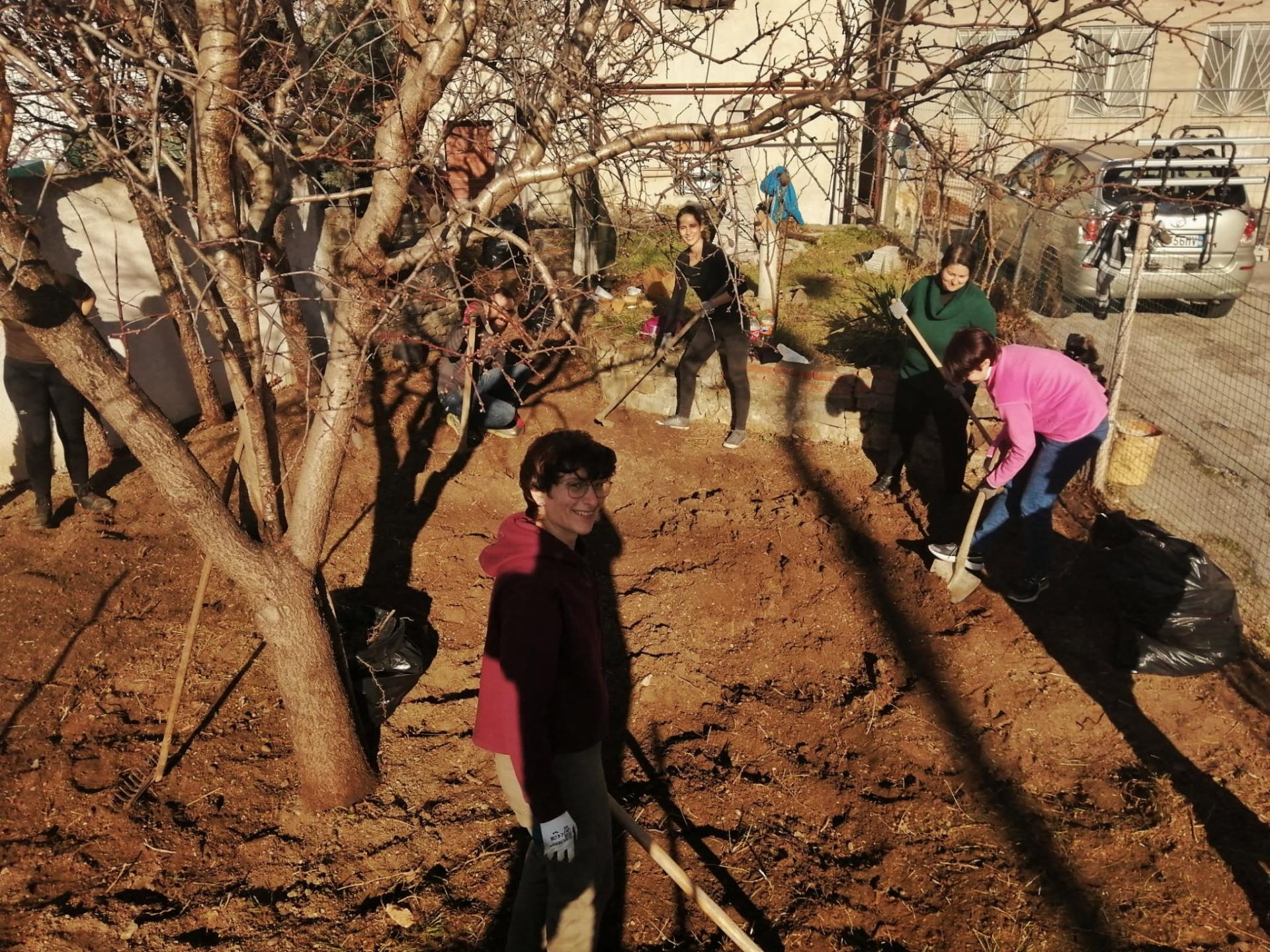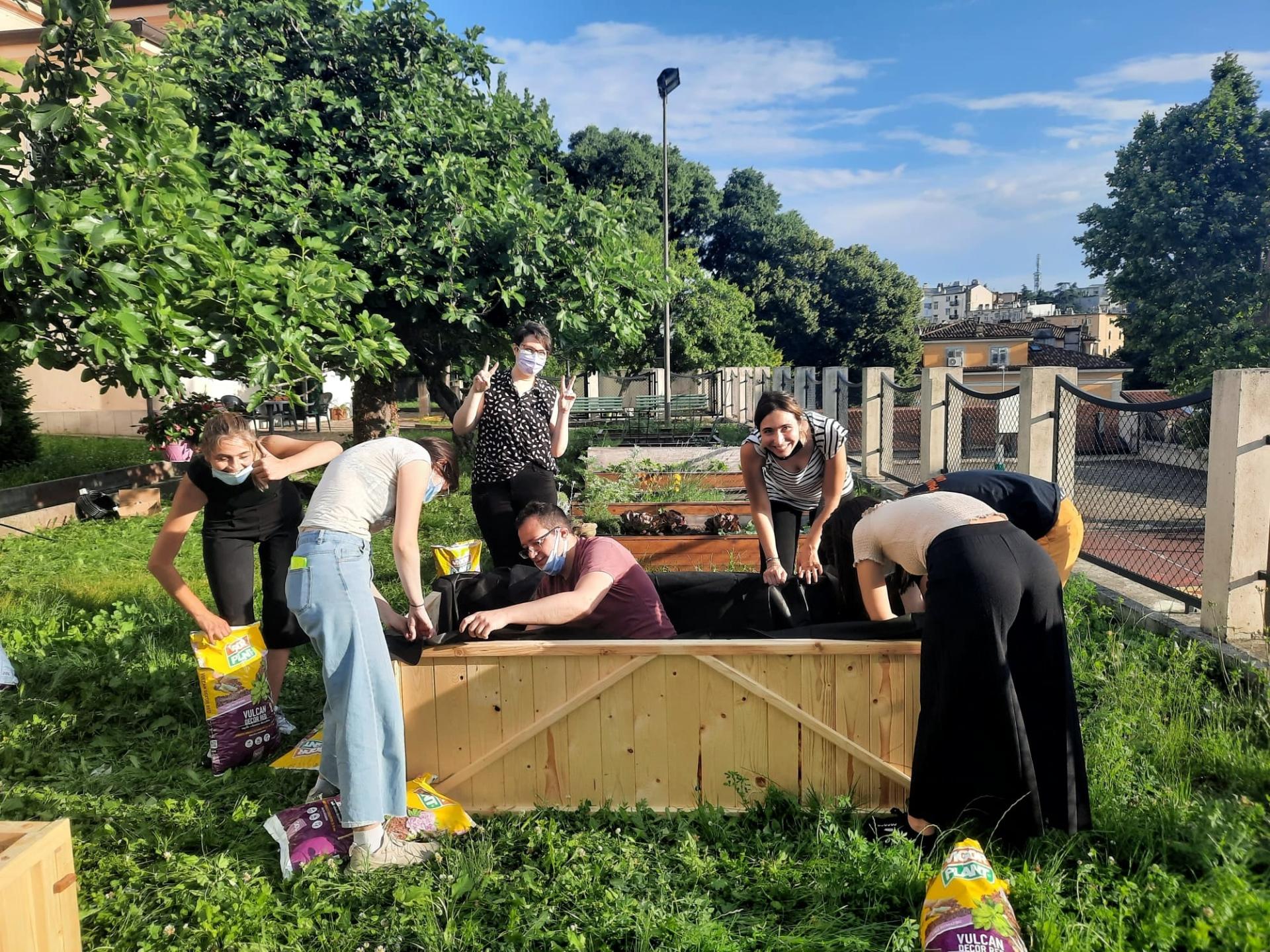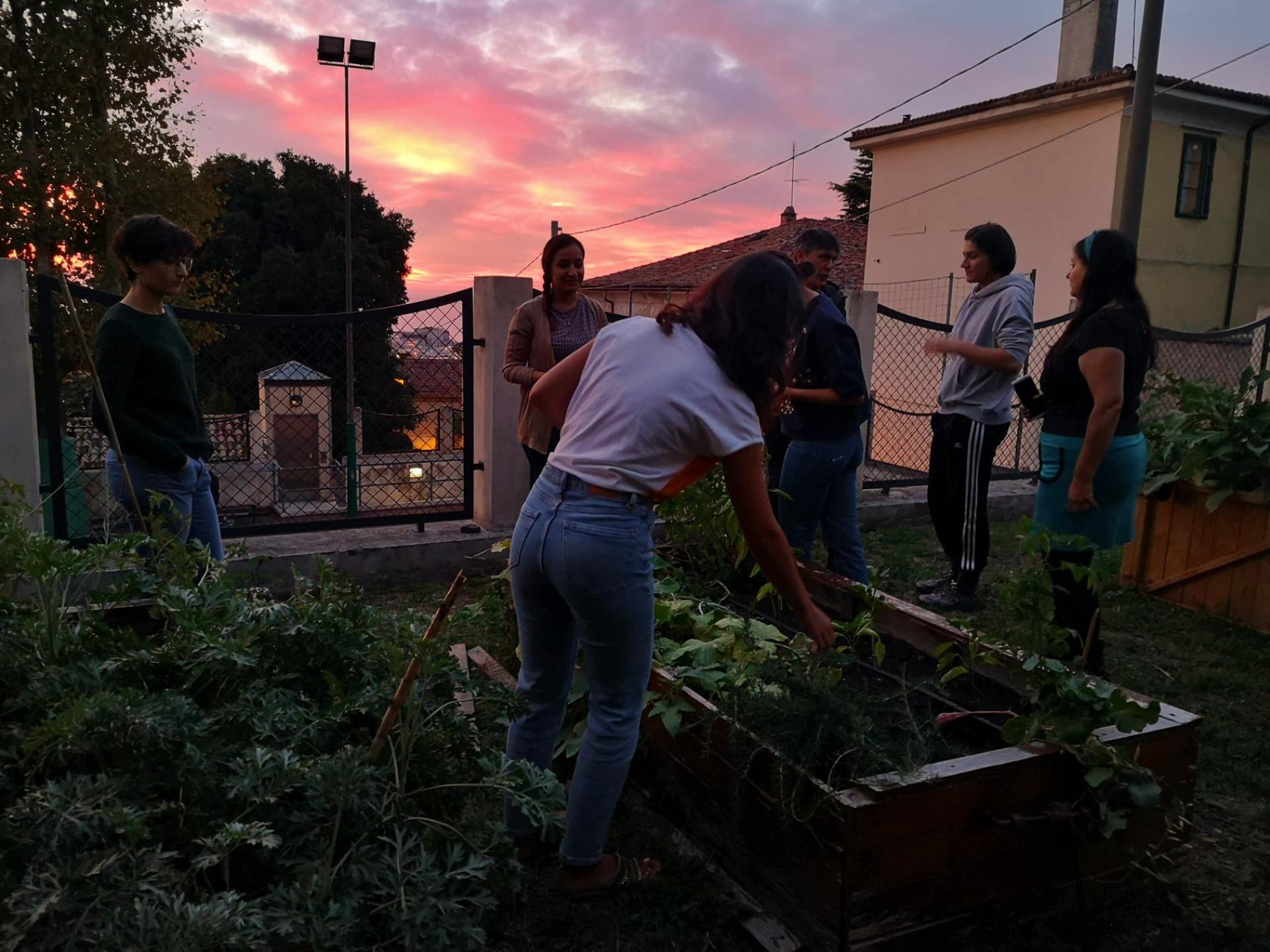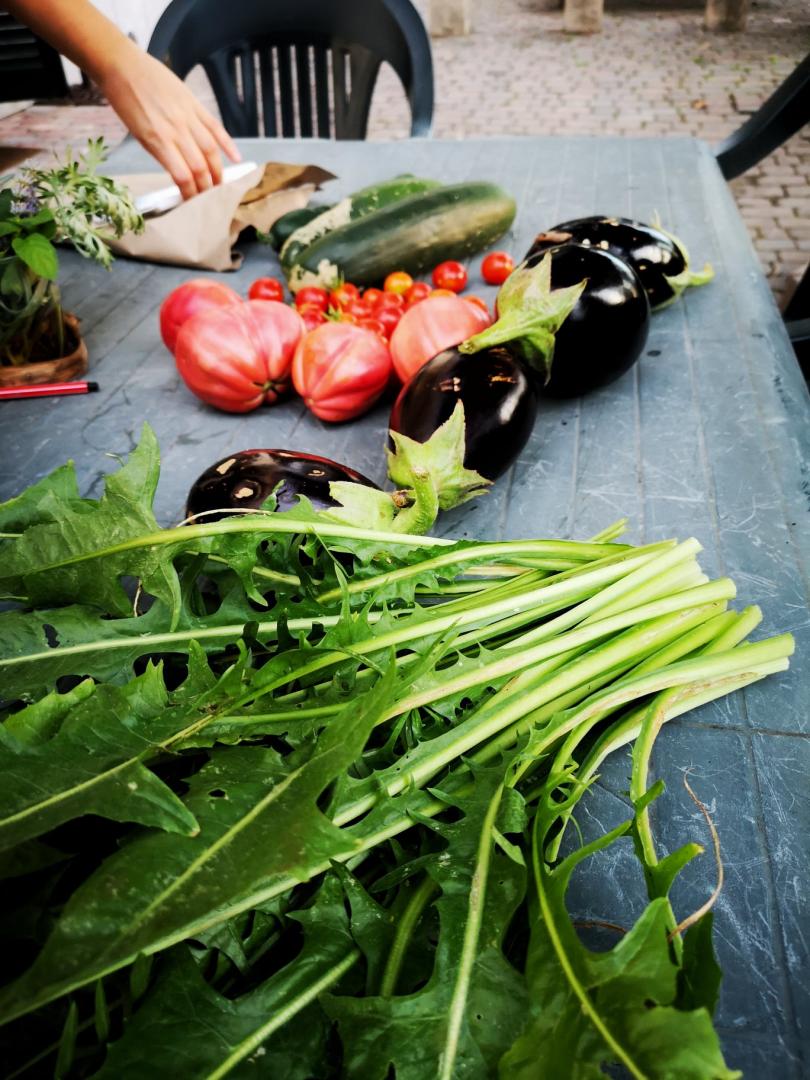UGorà!
Basic information
Project Title
Full project title
Category
Project Description
UGorà! is an inclusive Urban Gardening project that is run by enthusiastic volunteers, and as such our aim is to build a tight-knit local community for anyone interested in gardening and horticultural activities. Working together, participants from all walks of life can partake in the entire cycle of planning, looking after and harvesting of an organic vegetable garden, learning new gardening skills and encouraging a healthy and active lifestyle and encouraging intergenerational interaction.
Geographical Scope
Project Region
Urban or rural issues
Physical or other transformations
EU Programme or fund
Which funds
Description of the project
Summary
Since 2021, Ugorà! is a volunteer run Urban Gardening group which aims to create community run vegetable gardens across the city of Trieste, promoting voluntary action, gardening knowledge, neighbourhood participation and a sustainable and inclusive vision for the city of the future.
Creating volunteer-lead and locally based work groups, interested individuals work and learn together by taking over previously abandoned and/or neglected plots of land (which are a commonplace site in Trieste) and reverting them to productive vegetable gardens, adding aesthetic and social value to the cityscape. Once negotiating the terms of management of a new plot with the land owner and our local council authorities, we develop an action plan and then work all together during scheduled meet-ups to clear the overgrowth, clean the site of rubbish, create beds, sow vegetable crops, do the upkeep and management of our crops and then partake together in the harvest which is distributed equally amongst volunteers.
We also host various social get-togethers, educational and fun events such as film screenings, specially themed gardening days, workshops, community rubbish clean-ups, hikes, pic-nics and dinners, events in which we aim to interact with the general public, open board meetings and more. Interactive activities such as skill sharing, working, sowing and harvesting together are the foreground of Ugora’s activities, thus offering the chance to bring neighbours and generations closer together, enhancing inclusion as well as neighbourhood development and offering a platform to discuss current issues regarding Urban resilience and sustainability.
We have particularly emphasized intergenerational interaction during the challenging times of the Covid-19 pandemic, by promoting one-on-one conversations between elderly people and young volunteers on the topic of agriculture, through phone interviews that ensured the safety of the participants.
Key objectives for sustainability
Our approach towards the themes of sustainability has been motivated by a multidisciplinary approach, not only focusing on the environmental aspect but also on human well-being, and how they intertwine. We were motivated by the promotion of urban gardening as a means to gain practical, direct experience of food production, sparking a critical thought process concerning current food market practices. We wanted to create an opportunity for people living in the city, who may not have access to private green spaces, to approach gardening, for the first time in their lives or some, and as a form of reconnection to their previous experience for others.
Unused or neglected plots of land were chosen based on their strategic location within the urban fabric in order to achieve a regeneration of the spaces, all this was undertaken with the scope of re-evaluation by giving them new functions of fertility and food productivity, as well as putting them in the spotlight as potential spaces for community aggregation.
To achieve this, group meet-ups were arranged with the participation of experts and existing volunteer associations to present and discuss relevant themes concerning food systems, environmental protection and inclusivity, with the help of tools such as presentations, documentaries and workshops. We made sure the discourse was always led in a horizontal way, not lecturing people but motivating them to engage in conversation and further expand on the topics chosen.
At the same time, we aimed at building a community around the project, providing physical spaces where people could meet outdoors and share a vision and a set of activities that helped bring them together, after a long period of isolation due to the Covid-19 pandemic. We also focused on building an intergenerational connection, so that younger people could reconnect with the agricultural knowledge of elderly people, and transfer that experience in their own approach.
Key objectives for aesthetics and quality
Since the beginning we have always believed that our project would improve the aesthetic quality of the areas we manage. By purposely choosing abandoned and neglected spaces and re-enhancing them by removing weeds, clearing rubbish, implementing garden design and management we aim to actively re-inhabit and enhance the livability of spaces previously considered ”eyesores”.
From the earliest stages of the project, a contest for visual artists was organized. With the help of some members’ previous experience, we aimed to deeply transform the gardens, turning them into exhibition spaces. We hoped to motivate local artists to engage and to express their environmental sensibility, in ways that could get viewers involved with the subject. We displayed the art pieces alongside excerpts of the elders' interviews, in order to maximize the visibility of that side of our project for anyone who was going to be involved.
We have used recycled materials to build benches, because we wanted to highlight that accessibility and comfort of the space do not need to be tackled from a buyers’ perspective, but that they can also become processes that bring people together, strengthen the bond of the group and provide a further learning experience to the participants.
We aimed at emphasizing a type of beauty going deeper than the aesthetic value, that comes from direct interaction between humans and sharing life experiences. Coming from a period of self-isolation due to the Covid-19 pandemic, we understood firsthand how people were feeling fragmented and uprooted. Our personal sensibilities and paths of life led us to design a project that could safely bring people back together and get them outdoors, challenging them to reinhabit a space and to share a dialogue on its development. We wanted to foster the sense of belonging of the people to the space, which is why we encouraged conversations between different generations, drawing from the past to envision a new future.
Key objectives for inclusion
As an association, our vision of community is firmly based on the principle of inclusion, and as a consequence it is extremely important to us to create an atmosphere that is open, friendly, safe and inviting as well as rendering gardening activities accessible to people of all abilities. In this sense participating in the association is and will remain free of charge and embedded in a local context.
All of our gardening and meeting sites can be reached by public transport or on foot and we strive to create our new gardens as barrier free as possible by planning paths and walkways accordingly and creating vegetable beds at ground level as well as in raised beds above the ground. Beyond gardening activities, Ugorà! strives to be a safe space for the local community where any kind of discrimination is absent and everyone can freely express themselves in a respectful manner. In order to achieve these aims various steps have been taken from the appointment of persons of reference in terms of personal welfare, a democratic approach to association structure and decision making when planning gardening activities, various events centered on intergenerational exchange of gardening experiences (we greatly value the in-depth knowledge and know-how of our older community members).
Furthermore we are very proud of the internationality of our members and we are currently planning gardening days especially targeted at disabled, elderly and young community members. We believe that gardening holds something for everyone, no matter their age or physical abilities.
Results in relation to category
The project was started by a small group of people who were interested in increasing the environmental consciousness of the general public in Trieste. Choosing to start the gardening activity in the outdoor space of a youth center was an effective way to increase the visibility of the project and to reclaim the communal function of the spaces, which had decreased because of the pandemic. Over the first months, we invested in a widespread social media campaign in order to spread its visibility beyond those who already were regular visitors of the youth center.
Thanks to a democratic, inclusive and flat approach, we made sure that the transition from citizen to volunteer was seamless. The opinions and needs of everyone who was interested in participating were listened to, and the design of the garden as well as the crops chosen were topics that were agreed upon by the whole group.
Due to the diverse backgrounds of the participants and a constructive environment of mutual exchange of expertise and capacities, the project grew in complexity and effectiveness. Sharing seeds, plants, materials and tools lowered the cost of implementation while increasing the value of the project in terms of tangibility and sense of belonging and participation.
The intergenerational interaction brought an improvement to the structure of the community, as younger members, both those who moved to Trieste in recent years and those who are born here and need to find stimulating opportunities for personal growth, have gained an unique grounding opportunity and now have a better understanding of how life used to be traditionally in the area and how people related to the basic need for food. At the same time, older generations have had an opportunity for their experience to be appreciated and to interact with strangers in a moment of time where meeting new people can be more challenging, recognizing the value of their experience.
How Citizens benefit
The project was started by a small group of people who were interested in increasing the environmental consciousness of the general public in Trieste. Choosing to start the gardening activity in the outdoor space of a youth center was an effective way to increase the visibility of the project and to reclaim the communal function of the spaces, which had decreased because of the pandemic. Over the first months, we invested in a widespread social media campaign in order to spread its visibility beyond those who already were regular visitors of the youth center.
Thanks to a democratic, inclusive and flat approach, we made sure that the transition from citizen to volunteer was seamless. The opinions and needs of everyone who was interested in participating were listened to, and the design of the garden as well as the crops chosen were topics that were agreed upon by the whole group.
Due to the diverse backgrounds of the participants and a constructive environment of mutual exchange of expertise and capacities, the project grew in complexity and effectiveness. Sharing seeds, plants, materials and tools lowered the cost of implementation while increasing the value of the project in terms of tangibility and sense of belonging and participation.
The intergenerational interaction brought an improvement to the structure of the community, as younger members, both those who moved to Trieste in recent years and those who are born here and need to find stimulating opportunities for personal growth, have gained an unique grounding opportunity and now have a better understanding of how life used to be traditionally in the area and how people related to the basic need for food. At the same time, older generations have had an opportunity for their experience to be appreciated and to interact with strangers in a moment of time where meeting new people can be more challenging, recognizing the value of their experience.
Physical or other transformations
Innovative character
On a local scale, Ugorà! is a unique project because it is the only group engaged in promoting community gardening that is open for any citizen’s participation in Trieste. We are specifically motivated to always increase our visibility both online and offline, and aim at spreading a number of gardens and orchards in every neighbourhood of the city to ensure the widespread possibility for people to come in contact with the idea of producing vegetables within the city, while renewing their interest for the value of Trieste’s green spaces.
In a more universal way, we believe that the major value of the project lies in the fact that horticulture is not our single conclusive target. More so, we approach food production as the fulcrum of a critical collective discourse on sustainable urban development, that puts human well being at the center, but also considering our position in relation to the environment and the direct responsibilities caused by our decision making as a community.
To us, food production is a tool for community building, a way to carry people outside of the isolation that occurred because of the way life within the city is currently organized, and that was only exacerbated by the Covid-19 pandemic, and to appropriate public spaces in non-individualistic ways. With an intersectional approach, dedicating time to a practical activity such as gardening becomes a socializing and formative moment that brings together people with very diversified backgrounds.
Our approach is innovative in our city as it wants to challenge the conventional idea that public green spaces can only have recreational or aesthetic value, to be passively enjoyed by citizens. We hope the community gains a sense of proactive belonging as we help them reshape abandoned spaces into places for social aggregation, learning to value their multifunctionality.
Learning transferred to other parties
We firmly believe in the contemporaneity of our undertakings, therefore the passing on of our results and learnings lies at the heart of our project. Since our effectiveness and scope for action grows the more people participate, we try to reach out to the interested public as much as possible and we are eager to report and communicate on our findings and learning processes as a new community association.
Our work with the public includes the maintenance of our website and social network pages, on which people can inform themselves about upcoming activities, follow the progress in our various gardens, and they remain valuable to interact with people who have previously not heard of us. Our website has been used to fully showcase our results, displaying the interviews archive in its entirety, all the artworks that participated in our contest, a map of our garden locations, an open form for reporting abandoned spaces as well as a news section that is coordinated with our social media accounts, which act instead as a day to day work diary.
However, our physical presence has always formed the core of our communication with outsiders, and our many events are always open for everyone, creating platforms in which we meet, interact, engage in discourse and exchange knowledge, starting from our gardening and cleaning meet-ups, cross-generational encounters, organizational meetings and public educational events in cooperation with local schools and businesses that are planned for this year. Cooperating and networking with other volunteer associations is a key to radicate in our urban fabric and expandig the effectivness of our actions. We have learnt that getting jobs done together builds community like no other thing, especially given the opportunity of watching spaces transform completely under our own work.
Our project in essence is a project of sensibilisation with the possibility of reaping the rewards all together, and so far we consider it an outstanding harvest!






